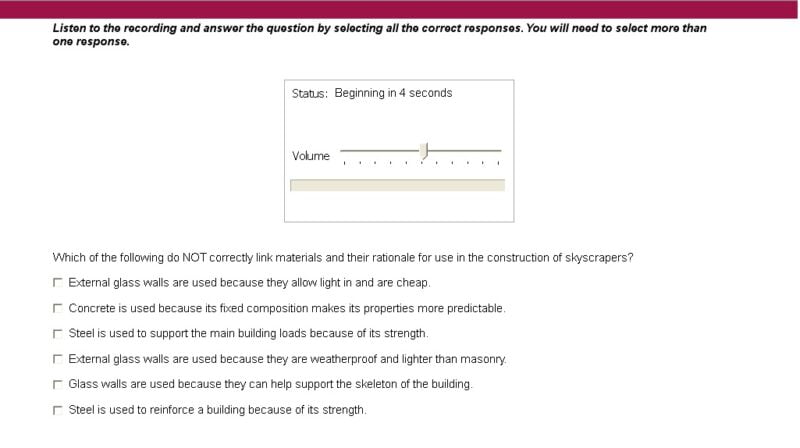The PTE Academic test (Pearson Test of English) is a widely recognized English proficiency exam for students and professionals. Among its various question types, the Multiple Choice, Multiple Answers (MCMA) questions often pose a challenge, especially for test-takers unfamiliar with the structure or strategies to tackle them effectively. These questions appear in both the Reading and Listening sections and require you to identify all the correct answers from the given options. Let’s dive into what these questions entail and how you can master them.

What Are Multiple Choice, Multiple Answers Questions?
In the Listening section, you’ll listen to an audio clip and then choose multiple correct answers based on the information in the clip. These questions are worth less than 1 percent of the overall score, so do not worry even if you cannot get them correct.
Key Features of MCMA Questions:
1. Multiple Correct Answers: There will always be more than one correct answer, but there will also be distractors—incorrect answers designed to confuse you.
2. Negative Marking: Unlike some other question types, MCMA questions penalize incorrect selections. Points are deducted from your score for each incorrect answer. However, your score for these questions cannot go below zero.
3. Partial Scoring: You receive points for each correct answer you choose and lose points for each incorrect one. It’s important to balance accuracy with careful judgment.

Why Are These Questions Challenging?
1. Negative Marking: Many test-takers are unsure about whether to take risks or play it safe due to the negative marking.
2. Time Constraints: In the Listening section, time management is crucial. Spending too much time on one MCMA question can hurt your performance on other questions.
3. Distractors: The incorrect options are often plausible and closely related to the text or audio, making it harder to spot the correct answers.
4. Comprehension Under Pressure: Especially in the Listening section, you have to process information in real-time and remember key details while choosing answers.
Strategies for MCMA Questions in the Listening Section
1. Focus During the Audio: Pay close attention to the audio clip. Take notes if necessary, especially for key details like numbers, names, or repeated phrases.
2. Understand the Question: After the audio ends, carefully read the question to clarify what you need to focus on in the options.
3. Use Your Notes: Refer to the notes you took during the audio to confirm your answers. This helps you avoid relying solely on memory.
4. Don’t Rush: While time is limited, ensure you’ve evaluated all the options before making your selections. A hasty decision can lead to errors.
5. Be Wary of Distractors: Just like in the Reading section, incorrect options in the Listening section are designed to seem plausible. Double-check your choices to ensure they align with the audio.
Common Mistakes and How to Avoid Them
1. Choosing Too Many Options: Some students think selecting more options increases their chances of scoring. However, negative marking means this strategy can backfire. Only select options you’re confident about.
2. Ignoring Partial Scoring: Avoid skipping questions entirely. Even if you’re unsure, selecting one or two answers you feel confident about can still earn you partial points.
3. Not Managing Time: Spending too much time on one MCMA question can leave you rushed for others. Allocate a set amount of time (e.g., 2 minutes for Reading, 1 minute for Listening) and stick to it.
4. Not Practicing Enough: Practice is crucial for understanding how to handle MCMA questions effectively. Familiarity with the question type reduces test-day anxiety.

Practice Makes Perfect: How to Prepare for MCMA Questions
1. Use Official PTE Materials: The official PTE practice tests and materials are the best resources, as they reflect the real exam structure and difficulty level.
2. Practice With Timers: Simulate exam conditions by practicing with a timer. This helps you improve both speed and accuracy.
3. Analyze Your Mistakes: After practicing, review the questions you got wrong. Identify why you chose the wrong answers and how you can avoid similar mistakes in the future.
4. Build Vocabulary: For the Reading section, a strong vocabulary can help you understand the passage and options more easily. Use apps like Quizlet or Anki to learn new words daily.
5. Listen to English Audio Regularly: For the Listening section, immerse yourself in English audio, such as podcasts, audiobooks, and news reports. Focus on understanding the main ideas and key details.
Final Tips for Test Day
1. Stay Calm: Stress can affect your concentration. Stay calm and approach each question methodically.
2. Prioritize Accuracy Over Guessing: If you’re unsure about an option, it’s better to leave it unchecked than risk negative marking.
3. Don’t Overcommit: Remember, it’s not necessary to select all the options. Aim for quality over quantity.
4. Review if Possible: If time permits, quickly review your answers to ensure you didn’t make any obvious mistakes.
Conclusion
The Multiple Choice, Multiple Answers questions in the PTE Academic test may seem daunting at first, but with the right strategies and consistent practice, you can tackle them confidently. Remember to stay focused, practice regularly, and approach each question with a clear mind. By mastering these questions, you’ll not only improve your overall PTE score but also enhance your English comprehension skills—a valuable asset for academic and professional success.
Gaurav Thapa is an experienced instructor of English as a Foreign Language. He has eight years of experience teaching IELTS and PTE.